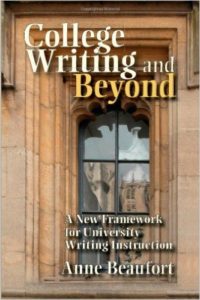 In Appendix A to her second book, College Writing and Beyond (2007), Anne Beaufort worked to improve learning outcomes, “including positive transfer of learning for an academic writing class.” But five years later, after further reading, reflection, and observation of her students’ difficulties, she recognizes the need to give students “a stronger skill base in academic writing and to foster more positive transfer of learning from writing courses to other contexts for writing” as she articulates in her article, “College Writing and Beyond: Five Years Later” (2012). Here, she revisits her sample course outline and previous suggestions, acknowledges the problems she sees with the pedagogy and curriculum she previously set forth, and explains what she is now experimenting with as she continues to teach college writing.
In Appendix A to her second book, College Writing and Beyond (2007), Anne Beaufort worked to improve learning outcomes, “including positive transfer of learning for an academic writing class.” But five years later, after further reading, reflection, and observation of her students’ difficulties, she recognizes the need to give students “a stronger skill base in academic writing and to foster more positive transfer of learning from writing courses to other contexts for writing” as she articulates in her article, “College Writing and Beyond: Five Years Later” (2012). Here, she revisits her sample course outline and previous suggestions, acknowledges the problems she sees with the pedagogy and curriculum she previously set forth, and explains what she is now experimenting with as she continues to teach college writing.
Beaufort highlights four considerations for improvement to her previously proposed curriculum:
- Clarifying assumptions about learning goals in writing courses
- The issue of guideline for course theme(s) and the relationship to teaching for transfer
- Applying principles of transfer of learning explicitly to the pedagogy associated with associated with any writing tasks in any instructional setting
- The ideal types and number of genres in academic writing classes with pragmatic aims
When discussing her first consideration, Beaufort acknowledges that “the major writing projects proposed in Appendix A are not the best for helping students gain analytic skills and rhetorical skills in typical academic genres. Students are asked to write in too many genres in a single writing course and in genres that are not widely used in a lot of other academic disciplines.”
When discussing the second consideration, she identifies her proposal in Appendix A to utilize a course theme, “Writing as Social Practice.” Beaufort’s concern here is not with the proposed theme, however—it is the limitation she implicitly set on potential themes: What I did not say as clearly as I would like to now is that this is only one possible course theme that would encourage in-depth intellectual exploration into subjects from any number of discourse communities.” Further, Beaufort notes that “Writing as Social Practice” as a theme “would enable writers to become more self-aware [but she] conflated that goal with the goal of teaching for transfer. Teaching for transfer can be accomplished, if appropriate strategies are used, no matter what the course’s subject matter.”

For the third consideration, Beaufort expresses her concern for the little explicit instruction given to writing teachers that is needed to teach students to understand and apply key concepts to writing tasks (discourse community, genre, rhetorical context, etc.). She notes that “[t]asks must be framed appropriately and repeatedly in order for writers to carry forward those big concepts to help them analyze and successfully accomplish writing tasks in other situations.” Also, helping students to understand and apply genre theory should become a standard practice in composition pedagogy, which was not previously made clear in Appendix A.
For the fourth consideration, Beaufort submits, “I did not think through carefully enough whether the particular genres I suggested for writing assignments in Appendix A would be most efficacious for teaching core academic writing skills.” She explains that she has removed her previous assignments from the syllabus (literacy autobiography, genre analysis, and ethnography assignment) and replaced them with two major assignments: a rhetorical analysis of a nonfiction text and a literature review of a body of research that seeks to address an important question.
Beaufort’s revisions cause me to reflect on my own pedagogy and curriculum design for first-year composition. I appreciate her honesty and candidness, and question to what extent I am encouraging students to compose in genres that will be meaningless to them once they have completed FYC. Or, is the integration of genre awareness as a threshold concept in my curriculum useful regardless of the genres students actually compose?
Beaufort, A. (2012). College writing and beyond: Five years later. Composition Forum 26. Retrieved from http://compositionforum.com/issue/26/college-writing-beyond.php.
